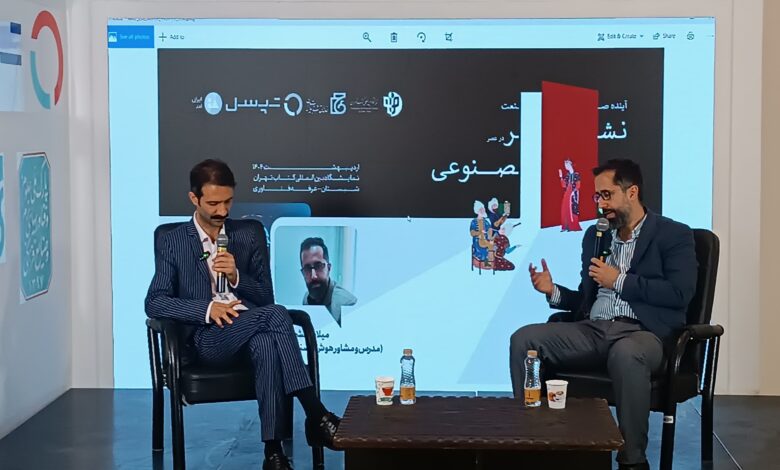A series of sessions on Artificial Intelligence in the Age of AI will be held in the Publishing Technologies Hall of the 36th Tehran International Book Fair, examining AI from various perspectives in the publishing industry.
According to Ideaagency, Milad Bakhshi, a lecturer and consultant on artificial intelligence and market research, said in a meeting held in the Publishing Technologies Hall that the result of publishers’ lack of attention to AI is the industry’s immersion in the new world.
Bakhshi explained about AI’s entry into the printing industry: “The debate over human creativity for artificial intelligence is not yet resolved, but it is inevitable. The more publishers move towards it, the better, otherwise the flood of AI will sweep them away.”
Pointing out that e-books have grown in recent years and have been well-received by audiences, he said: “Sometimes video is used for reading books, and in the end, personalization is done with the help of artificial intelligence.”
Bakhshi added: “artificial intelligence has not yet reached the position of the originality of the writer and has not been able to replace it. The likelihood that artificial intelligence will completely replace humans in the publishing industry is low but possible.”
Pointing out that the publishing industry can benefit from improving processes, he explained: “Reasonable pricing and book inventory control are examples that can be used in this area. Predicting and identifying the right price are among the actions of artificial intelligence.”
Bakhshi noted: “artificial intelligence helps the publisher understand the issue of the moment and guide him on what kind of content to produce. Artificial intelligence can identify young writers with network mapping. Another issue is improving creativity and improving their work. If it uses the space correctly, it will be effective.”
He explained the importance of the law for the use of artificial intelligence: “In the world, leading publishers must declare what use they make of artificial intelligence so that it can be promoted in the book space. These steps must be made clear and laws must be considered for it. We must examine how far artificial intelligence will go and how it should be included in the legislative space. Naturally, the mechanisms must be clarified for publishers. artificial intelligence is changing past processes and business models and increasing per capita reading, they are reading more, and in the process of becoming more agile, their roles are being eliminated, such as editors and translators.”
Regarding the importance of humans adapting to artificial intelligence, Bakhshi said: “artificial intelligence will not stand still and humans must adapt to it. To formulate the rules of artificial intelligence in the printing industry, a discourse in writing, editing, and translation must begin in order to reach a conclusion.”
He added: “With the rise of artificial intelligence in cyberspace, the amount of unsubstantiated and low-quality content may increase. In the field of literature, this content may increase, which is one of the black spots of AI and a solution must be thought of for it.” Bakhshi stated: “A suitable combined approach must be adopted to reach an optimal point. Naturally, one must try to make humans and machines complement each other.”
Regarding whether publishers, translators, and editors should forego intellectual property rights in the era of artificial intelligence, he said: “It depends on the level of involvement of the artificial intelligence, does it do all the steps? Different levels should be considered for it.”




No Comment! Be the first one.